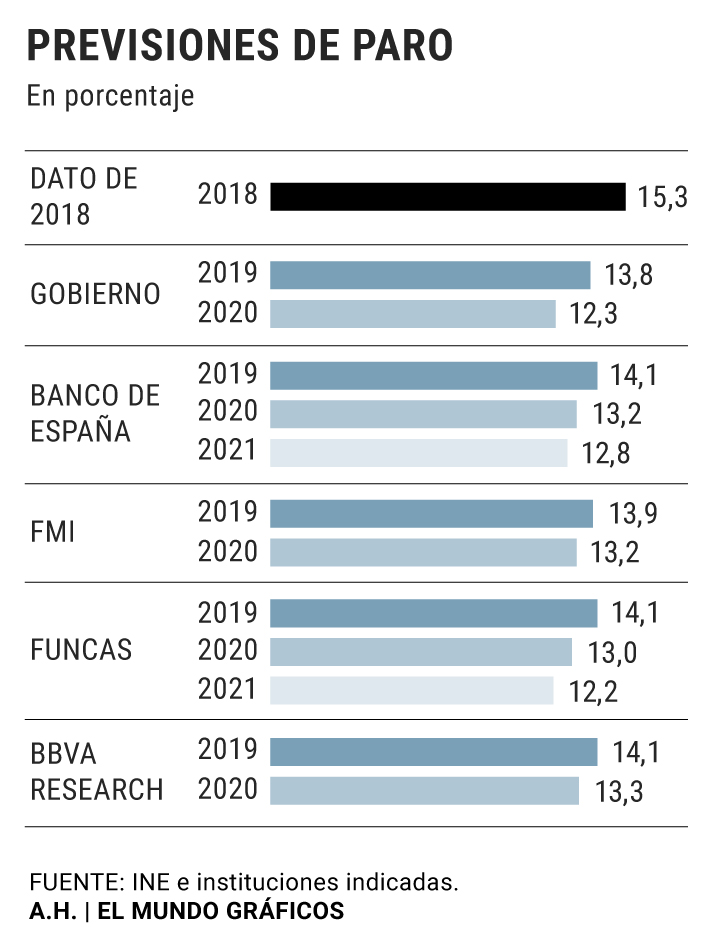- Budget Plan.Sanchez promises 360,000 new jobs and social measures worth 5.4 billion
- Budget Plan: The acting Government commits to Brussels to increase 0.9% in pensions and 2% in the salary of civil servants
The Government of Pedro Sánchez foresees a prodigious employment evolution . According to the Budget Plan sent to Brussels, the labor market will not only continue to generate jobs despite the economic slowdown, but its level of creation will be higher than the growth rate of the Gross Domestic Product (GDP), something that is very complicated to occur given the characteristics of the Spanish economy. In fact, so much so that it has never been recorded in recent economic history.
Specifically, the Executive maintains that the employed population, measured in full-time equivalent employment, grew 2.5% last year, will rebound 2.3% in the present and will remain above 2% next. These two growth points, for example, represent a creation of just over 350,000 jobs in 2020, the year in which the economy will clearly grow below 2% according to all forecasts .
"It is quite complicated to believe," says María Jesús Fernández, senior economist at Funcas, who adds that the Budget Plan also contemplates "three years of negative productivity, which would be the first time in history to be recorded ." "It is true that the relationship between growth and job creation has changed, but those figures are too optimistic," continues Fernández, who also refers to a relevant debate that has been installed in the economic field. Until the arrival of the great recession, Spain needed growth of over 2% to generate employment, while at lower rates jobs began to be destroyed. But as a result of the crisis, the changes registered in the economy, companies and in the legislation itself, that figure seems to have clearly changed, although there is still no consensus as to what the new relationship is.
Some economists, such as Juan Ramón Rallo, estimate that the new threshold may be over 1.5%, while Alicia Coronil, director of economics at the Businessmen's Circle, explains that in some years it has been observed "almost a 1 to 1 correlation "between employment growth and the economy. The evolution, therefore, seems evident, but in no case sufficient to support the Government's forecasts .
" We are going to see a rate of job creation that is going to go down and the unemployment rate is not going to fall substantially in the next two years, " explains Coronil, which in this way coincides with the warnings that have already made the International Monetary Fund (IMF), the Bank of Spain, BBVA Research or Funcas. All these organizations and study services estimate, to a greater or lesser extent, that employment will suffer a slowdown. But the Government, which has already been forced to revise its growth prospects slightly downwards, refuses to recognize that the unemployment rate will freeze at still very high levels. And less, just before the holding of the general elections .
And beyond 2020?
If the observed period is extended a little further, that is, if it is taken beyond 2020, the question that arises is whether there is a real risk that jobs will begin to be destroyed. "We hope that growth will be maintained in a range of between 1.5% and 2%, where we believe that it will continue to create employment," Fernández responds to this issue, but also warns: " If the economic deterioration were greater and if there was a global economic accident, maybe employment could be destroyed , but it is not our central scenario. "
According to the criteria of The Trust Project
Know more- Graphics
- job
Sanchez Budget Plan promises 360,000 new jobs and social measures worth 5,400 million
Labor150,000 temporary teachers to the rescue of Sánchez in the latest unemployment data before 10-N
EmpresasWeWork and the beginning of 'desuberización': the collaborative economy becomes adult

